Maximum money deposit for expat American
I need to know if there is a maximum amount of money that the United States will allow a U.S. citizen to deposit in a Filipino bank? I was told there is. If there isn't and you deposit let's say $50,000.00 does U.S. require taxes to be paid or any penalties to be paid on this money?
if there are any Americans out there who have sold there homes or pull down there retirement money before they move to the Philippines. What did you do to move your money to the Philippines? let's say you decided to buy a home there how did you get your money from U. S. to Philipines?
dont think the issue is if the us have maximum --its more to do with the bank you will use to transfer the money and how much they allow you to transfer-when you travel to phils you are allowed to bring in a maximum of 10000 $ .
Hello Wayne 07,
I don't think there is a maximum amount you can have in the Philippines. When you arrive in the country you are allowed to bring in up to a maximum of 10,000.00php or 10,000.00USD cash before you have to declare it to the government here. As far as I know, this is done to prevent money laundering between countries. The easiest way is to bring your U.S. checkbooks with you in your carry on luggage to prevent theft of the checkbooks while traveling. A versateller card can work also, but may be limited on how much you can withdraw each day. You can get around the report requirement for a deposit by depositing 9,000.00USD a day. You can open a Philippine Bank account and then deposit into it daily a check till you reach the amount you want here. Foreign checks deposited here can take up to 30 days or more to clear the banks and exchanges. Talk with the Philippine bank you want to use and see what their reporting requirements are also. The only thing you will have to do at the end of the year, is file a tax form for each country for funds held in off shore banks with the USA and for interest received in each country. In the USA, banks are required to report deposits and withdrawals of 10,000.00USD or more to the government. If reporting paperwork does not bother you, then you can use a larger amount on your checks. Philippine banks have several types of accounts, you will need to check with them to see which will benefit you the most. There are both Dollar and Peso accounts here. If you are concerned about the exchange rate then you may want a dollar account and watch the exchange rate for an increase and then do the exchange into a peso account. Bank fees vary widely here so you may want to shop around. Also your account is stuck in the bank that you open it in. Best to find out where you will permanently reside and then select a bank to use, or you may find your self driving, flying or sailing a great distance to do any indoor banking on your account. If you are going to express sends from a USA bank, then you will have to setup the transfer agreement in the USA with the bank, come here and open an account, and the return to the USA to do the first required transfer at you USA bank, unless you leave a POA in the USA to do it for you.
The sale of your USA home will require you to file a capital gains tax form when you file your income taxes for the year of sale. Consult an accountant in the USA about the sale when you do it. The accountant may also know about moving money offshore to another country, because they do income taxes for their clients. He can also advice of any tax laws that may pertain to you in the USA also. Buying property in a foreign country will not meet the standard for reinvestment of capital gains. This may save you money in the long run.
You mentioned buying a home here in the Philippines. Be advised, if you are not married to a Filipino, then you can not own property in the Philippines, except for a condo. Property ownership here is vested into a general split of 40% foreign ownership and 60% Filipino ownership. With a condo, you do not own the land, just the building leaving you at the mercy of the property owner if you have a disagreement. Philippine laws are designed to benefit the Filipino, not a foreigner. Philippine law can be viewed online if you want to get a feel of what your rights are. Some will tell you that you can still own property here by being creative, they may just want to help relieve you of your money.
Google search can help you answer some of the questions you may have about living in the Philippines. Living here is nowhere near the style of living like in California or USA, believe me I know, I am from California. Culture shock can also be minimized by reading about the Philippine Culture. Hospitals here are also nowhere near the standard of the USA. Bring Kleenex travel packs with you to wipe your but. It was a big surprise when I arrived here.
If you are going to buy something here and are referred you to an attorney by them, find another attorney not in the area and not associated with the project to advise you. Also, do your due diligence with governmental offices before signing anything. If you do marry here and buy a home, just be aware that if you get separated, your investment goes to your Filipino wife. If your wife passes away, then the property goes to her family, so be sure you get along with them also before making an investment. Take your time, research, research, research before you do anything here.
I had some friends here that loved living here and the way their Filipino friends took them to all these different places and my friends payed for the tab for all the outings. When they ran out of money in 6 weeks and then their Filipino friends disappeared and now they are back in the USA starting over.
If you can get to know the lifestyle here and like it, then the most positive thing about living here are the wonderful people, who are willing to help you out with anything. This is a beautiful country to live in if you are willing to give and take a little. I am a retired building official from the USA and the building standards here are no way near the requirements of the USA, even though they have adopted the IBC here. The whole country here is in Seismic Zone 4 and construction standards here do not come close to the requirements for the zone.
Just do your due diligence on anything you are going to do. Google will be your best friend when researching things here.
Hope this helps, RAC
There isnt a maximum; however, the bank does have to report the amount to the US for tax and/or money laundering purposes. And remember the PDIC only covers deposits up to p500k. I would not risk all my cash to be held in the Phils. Keep your account in the US and transfer as needed.
Wayne,
As a US citizen nowadays you'll probably have great difficulty even opening a bank account in most countries. Because of the new IRS regulations FATCA (Foreign Account Tax Compliance Act) which requires foreign banks to report directly to the IRS on all accounts held by Americans abroad most banks are now simply refusing to let US citizens even establish an account.
http://www.irs.gov/Businesses/Corporati … -Act-FATCA
As far as deposit limits go, if you are leaving the USA you must declare the cash you are taking if it exceeds $10,000 USD and you will generally also have to declare it in most countries upon entry. Failure to do so can result in the funds being confiscated and criminal charges.
IRS also requires you to report (Form 8300) any funds in excess of $10,000 relating to a single transaction or any related transactions that you either receive from or pay out on any transaction (foreign or domestic) . This can be defined as a single transfer or a series of transfers, so don't think you can get around the requirements by simply splitting the transfer into smaller amounts.
http://www.irs.gov/Businesses/Small-Bus … -Form-8300
Sorry, but as far as beating the Tax Man, you're more out of luck than ever!
Cheers,
William James Woodward, EB Experts Team
dhnindc wrote:There isnt a maximum; however, the bank does have to report the amount to the US for tax and/or money laundering purposes. And remember the PDIC only covers deposits up to p500k. I would not risk all my cash to be held in the Phils. Keep your account in the US and transfer as needed.
This is most important, to not put more than 500,000 pesos in any bank in the Philippines. FDIC covers $250,000 in the USA, so for tax reporting purposes it is best to never hit the $10,000 cash balance on any one day as a total of all of your foreign accounts. You will still be required to pay USA income taxes and report all foreign income, no matter how little. You might want to check a list of financial institutions in the Philippines who have agreed to report transactions to the IRS and be sure to use such a bank. Transferring USA money to a foreign bank not reporting to the IRS means the USA bank is required to withhold 30% of the transfer as income tax. Of course when you file your form 1040 the withholding on transfers is put against your actual tax liability and you can receive the excess as a refund, but it insured that you will file your tax returns.
an american can make a wire transfer from his usa bank to his philippine bank - there is not limit for wire transfers - you will be required to report the highest annual balance of any account outside the usa during the time of your annual tax return
be careful in that only peso 500,000 is covered by insurance - why not opebn an acocunt with an american bank branch for example citibank
I may do that. I wanted to make sure I am doing what the law requires. I will just keep my money in USA. Bring it over when and if needed.
YES! YES! YES!
Leave it in the US or offshore if you are of higher net worth and need a bit more flexibility (at a price of course).
Drawdown on funds INTO the Philippines only as and when you need to. Remain in USD to avoid currency fluctuations/risk.
Don't buy land/property - unless you wish to donate it all to the local economy at a later date!!! It's all over-priced now anyway and as rightly stated elsewhere, Asian building standards and legal protection are both rubbish. RENT as required and MOVE around freely as required.
Don't think for one minute banks in Philippines are private and/or discrete. Sitting on a "lottery amount" of cash (in local terms) will advertise your net worth - risky. You may as well have 'victim' tattooed on your forehead!
All common sense really...
[moderated: off topic + pls avoid duplicate post]
Contact your bank. For example you have citibank account what you can do is open a phil citibank account and do the citibank global transfer however for CGT you are only allowed to transfer 2,000 to 10,000 per business day. What you can do is do a wire transfer however for outgoing wire transfer thay cost around 25 usd to 30 usf if you do it online.. i know this reply is old but i hope it helps to others
Yeah better set aside your funds in your usa banK however in regards for usa tax government will only require you to fill up the 1099 form for IRS for annual tax if your savings earn 10usd or more in one year. Citibank to Citibank transfer is for free domestic or international. Open a free account in citibank just do a bill payment or direct deposit and no need for you to maintain any average required balance. Wire transfer limit for citibank is 50,000 usd per business day for blue consumers im not sure for other banks.
I would like to point out one detail which you are misnonformed of, and that's about property ownership.
The laws of the land does not allow you to own land property, and that is if you are a foreigner.
Someone I know who is adept on that field usually advise foreigners marrying locals to have the land title annotated with "married to John Smith". That way, the Filipino owner can't sell the land property without the consent of the other party, in that case that's John Smith in the example.
You may own a house and have the title written under your name if you're a foreigner. The law is only specific to land ownership.
You are partially correct on that Gonzrule.
Philippine law does state that only a Native Born Philippine National can own property here. If you research farther, it will also advise you that any improvements to the land belong to the land owner, no matter what the improvements are. This can even mean that if you buy a bag of fertilizer and set it on the land, it now belongs to the land owner.
The only exception to the rule is a condo complex, which up to 40% of the units can be owner by an expat. It has been suggested that an expat lease the land for what in the law here is a fixed length of time up to 50 years. Then the property owner has to renegotiate the lease on the property. If the Filipino owner dies then the property ownership reverts to the Filipino's family in a certain order as described in the law and not the expat.
Yes, expats can have their names on the title as a 60% Filipino/40% expat ownership, but when it comes to the legal issues, the Filipino will win every time because of the interest issue in the land at 100%.
Hope this helps, RAC
gonzrule wrote:Someone I know who is adept on that field usually advise foreigners marrying locals to have the land title annotated with "married to John Smith". That way, the Filipino owner can't sell the land property without the consent of the other party, in that case that's John Smith in the example.
I know a few people who have done that, but when it comes down to the actual law, it has been stated that the only meaning of this is that the owner of the land is married to someone who happens to be a foreigner who can't own land anyway.
Many previous court cases have been quoted in this respect. And that is the thing... it eventually ends up as a court case, unless the couple agree amicably to the sale proceeds.
The Foreign purchaser also can't sell the land property without the consent of the Filipino owner, and I know of one where the Filipino is waiting for the foreign (ex) husband to die before selling... She has apparently agreed to sell, to agree with a possible legal issue, but insists on a price of about double the value, thereby rendering a sale impossible..
rcampsr wrote:….. If the Filipino owner dies then the property ownership reverts to the Filipino's family in a certain order as described in the law and not the expat.
Yes, expats can have their names on the title as a 60% Filipino/40% expat ownership, but when it comes to the legal issues, the Filipino will win every time because of the interest issue in the land at 100%.
Please be aware that a land lease contract is not "personal in character" and remains in force post death and the family of the deceased must honor the contract even if ownership changes.
This topic was reviewed in an earlier 2015 post where it was explained,
"Still a very secure and legal effect can be reached in a contract (without the use of the Usufruct Agreement) with the land owner or lessor, which survives the death of the parties and continues to bind the heirs, except if the contract states otherwise. Here the expat/foreigner must make sure it never states otherwise.
Proof - This concept has been clarified by the Philippine SC recently. In Sui Man Hui Chan v. Court of Appeals,
"we held that: “A lease contract is not essentially personal in character. Thus, the rights and obligations therein are transmissible to the heirs. The general rule, therefore, is that heirs are bound by contracts entered into by their predecessors-in-interest except when the rights and obligations arising therefrom are not transmissible by (1) their nature, (2) stipulation or (3) provision of law. In the subject Contract of Lease, not only were there no stipulations prohibiting any transmission of rights, but its very terms and conditions explicitly provided for the transmission of the rights of the lessor and of the lessee to their respective heirs and successors."
The SC went on to state,
"The death of a party does not excuse nonperformance of a contract, which involves a property right, and the rights and obligations thereunder pass to the successors or representatives of the deceased."
Source: G.R. No. 179594, September 11, 2013.
XE Currency exchange will transfer your money no matter how much from your US bank to the Philippines bank. They charge a fee but its less than most bank to bank because they are more trusted with such transactions by the US government. They handle all paperwork. Just Google XE Currency
All banks, and all Currency Exchange services can transfer any amount.
Banks charge more in fees than any of the Currency Exchange Services, unless you negotiate a special rate with your bank.
It can be done.
The banks assume tourist rates at first, but do the transfer within a few hours
The Currency Exchange companies work on commercial and competitive rates, but can take 3-7 days.
I use a Currency Exchange that charges zero fees, but about 0.75% profit on the FX rate
Another I looked at charges 1% and uses the mid FX rate.
The difference on $10,000 transfer was about 300 pesos
However, a recent Bank to Bank transfer took $4,500 from the amount charged in fees and rate loss !!
Avoid the banks, unless you can talk their manager into a special rate. I did once with HSBC, to equal the rate done by HIFX. But that only happens with large sums (mine was $300,000).
is there a us bank in the pi? like american express? or bank of america?
tomwynn wrote:is there a us bank in the pi? like american express? or bank of america?
Most like to keep their money in a USA bank, transfer in cash as they need it. This avoids having to file extra paperwork if at any time during the year your balances of all your foreign accounts is $10 ,000 or more. Wells Fargo works for transfers to the Philippines. Credit cards are accepted, suggest a Capital One card which has no foreign transaction fees.
Gonzrule don't believe that bit about having your name on the property title it means nothing the Filipino can still sell the land without your permission, I know of cases where this has happened , a Foreigner has no rights at all when it comes to land ownership
BPI has branches in the USA you can set up an account before you go to the Philippines
Deposit in your wife's account if you trust her, a bank cannot disclose how much is in her account to any one, it is part of the Constitution here in Philippines ,they will not disclose anything to the IRS about your wife's account
Articles to help you in your expat project in Manila
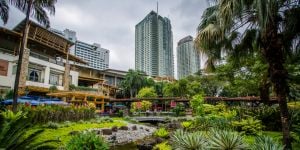
Accommodation in Manila
There are lots of renting options to choose from when relocating to Manila. Most expats in the Philippines live in ...
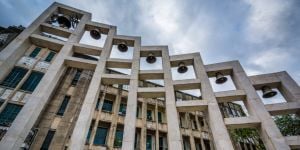
Studying in Manila
With more than a hundred universities dotted around the city, Metro Manila is very much the center of higher ...

Student life in Manila
Student life in Manila is relatively cheap and covers a wide range of activities that will surely pique an ...
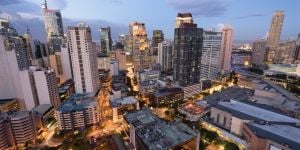
Work in Manila
Manila, also referred to as the National Capital Region, is the capital city of the Philippines and the ...

Things to do in Manila alone
Manila is a bustling and multicultural city. There is a plethora of activities in Manila to awaken the ...
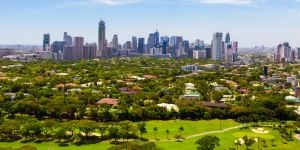
Buying property in Manila
Buying a property is a big and exciting step, but navigating the rules and regulations in a new country can be a ...

Developing a professional network in Manila
It might be challenging to establish a professional network, especially when relocating to Manila. But if you know ...
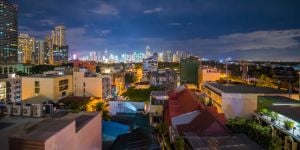
Choosing your neighbourhood in Manila
Choosing a neighborhood is one of the most critical decisions that expats need to make when moving to Manila. Each ...
Find more topics on the Manila forum




